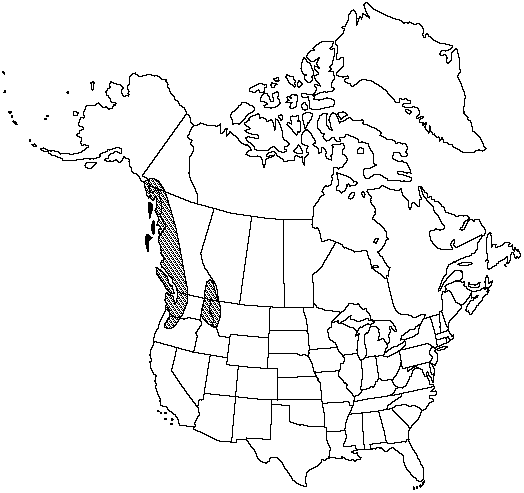Difference between revisions of "Polystichum andersonii"
Amer. Fern J. 3: 116, plate 9. 1913.
FNA>Volume Importer |
imported>Volume Importer |
||
| (7 intermediate revisions by 2 users not shown) | |||
| Line 8: | Line 8: | ||
}} | }} | ||
|common_names=Anderson's sword fern | |common_names=Anderson's sword fern | ||
| + | |special_status={{Treatment/ID/Special_status | ||
| + | |code=E | ||
| + | |label=Endemic | ||
| + | }} | ||
|basionyms= | |basionyms= | ||
|synonyms={{Treatment/ID/Synonym | |synonyms={{Treatment/ID/Synonym | ||
|name=Polystichum braunii subsp. andersonii | |name=Polystichum braunii subsp. andersonii | ||
|authority=(M. Hopkins) Calder & Roy L. Taylor | |authority=(M. Hopkins) Calder & Roy L. Taylor | ||
| − | }}{{Treatment/ID/Synonym | + | |rank=subspecies |
| + | }} {{Treatment/ID/Synonym | ||
|name=Polystichum braunii var. andersonii | |name=Polystichum braunii var. andersonii | ||
|authority=(M. Hopkins) Hultén | |authority=(M. Hopkins) Hultén | ||
| + | |rank=variety | ||
}} | }} | ||
|hierarchy=Dryopteridaceae;Polystichum;Polystichum andersonii | |hierarchy=Dryopteridaceae;Polystichum;Polystichum andersonii | ||
| Line 23: | Line 29: | ||
}}<!-- | }}<!-- | ||
| − | --><span class="statement" id="st- | + | --><span class="statement" id="st-undefined" data-properties=""><b>Stems </b>erect. <b>Leaves</b> monomorphic, arching, 3–10 dm; bulblets 1 or more, on distal 1/3 of rachis. <b>Petiole</b> 1/8–1/4 length of leaf, densely scaly; scales light brown, diminishing in size distally. <b>Blade</b> lanceolate, 1-pinnate-pinnatifid; base narrowed. <b>Pinnae</b> lanceolate-falcate, proximal pinnae ± triangular, not overlapping, in 1 plane, 2–10 cm; base oblique, acroscopic auricle well developed; margins incised to costae, segments adnate to costa for at least 2 mm, serrulate-spiny with teeth ascending; apex acute with subapical and apical teeth same size; microscales filiform, with contorted projections, dense abaxially, sparse adaxially. <b>Indusia</b> sparsely ciliate. <b>Spores</b> light brown to brown. <b>2n</b> = 164.</span><!-- |
-->{{Treatment/Body | -->{{Treatment/Body | ||
| Line 29: | Line 35: | ||
|elevation=100–1700 m | |elevation=100–1700 m | ||
|distribution=B.C.;Alaska;Idaho;Mont.;Oreg.;Wash. | |distribution=B.C.;Alaska;Idaho;Mont.;Oreg.;Wash. | ||
| − | |discussion=<p>Polystichum andersonii is an allotetraploid (D. H. Wagner 1979); its diploid parents are P. munitum and P. kwakiutlii. The triploid cross, P. munitum × andersonii, has been analyzed cytologically (W. H. Wagner Jr. 1973). It is the only sterile hybrid in the genus that develops large colonies through vegetative propagation by its bulblets. Hybrids look very much like some of the more deeply incised forms of Polystichum munitum except that they have abundant filiform scales, abortive sori, and nearly triangular lowermost pinnae with ± equally incised acroscopic and basiscopic auricles.</p> | + | |discussion=<p><i>Polystichum andersonii</i> is an allotetraploid (D. H. Wagner 1979); its diploid parents are <i>P. munitum</i> and <i>P. kwakiutlii</i>. The triploid cross, <i>P. munitum</i> × andersonii, has been analyzed cytologically (W. H. Wagner Jr. 1973). It is the only sterile hybrid in the genus that develops large colonies through vegetative propagation by its bulblets. Hybrids look very much like some of the more deeply incised forms of <i>Polystichum munitum</i> except that they have abundant filiform scales, abortive sori, and nearly triangular lowermost pinnae with ± equally incised acroscopic and basiscopic auricles.</p> |
|tables= | |tables= | ||
|references= | |references= | ||
| Line 38: | Line 44: | ||
-->{{#Taxon: | -->{{#Taxon: | ||
name=Polystichum andersonii | name=Polystichum andersonii | ||
| − | |||
|authority=M. Hopkins | |authority=M. Hopkins | ||
|rank=species | |rank=species | ||
| Line 51: | Line 56: | ||
|publication title=Amer. Fern J. | |publication title=Amer. Fern J. | ||
|publication year=1913 | |publication year=1913 | ||
| − | |special status= | + | |special status=Endemic |
| − | |source xml=https:// | + | |source xml=https://bitbucket.org/aafc-mbb/fna-data-curation/src/2e0870ddd59836b60bcf96646a41e87ea5a5943a/coarse_grained_fna_xml/V2/V2_378.xml |
|genus=Polystichum | |genus=Polystichum | ||
|species=Polystichum andersonii | |species=Polystichum andersonii | ||
| − | |||
| − | |||
| − | |||
| − | |||
| − | |||
| − | |||
| − | |||
| − | |||
| − | |||
| − | |||
| − | |||
| − | |||
| − | |||
| − | |||
| − | |||
| − | |||
| − | |||
| − | |||
| − | |||
| − | |||
| − | |||
| − | |||
| − | |||
| − | |||
| − | |||
| − | |||
| − | |||
| − | |||
| − | |||
| − | |||
| − | |||
}}<!-- | }}<!-- | ||
-->[[Category:Treatment]][[Category:Polystichum]] | -->[[Category:Treatment]][[Category:Polystichum]] | ||
Latest revision as of 21:23, 5 November 2020
Stems erect. Leaves monomorphic, arching, 3–10 dm; bulblets 1 or more, on distal 1/3 of rachis. Petiole 1/8–1/4 length of leaf, densely scaly; scales light brown, diminishing in size distally. Blade lanceolate, 1-pinnate-pinnatifid; base narrowed. Pinnae lanceolate-falcate, proximal pinnae ± triangular, not overlapping, in 1 plane, 2–10 cm; base oblique, acroscopic auricle well developed; margins incised to costae, segments adnate to costa for at least 2 mm, serrulate-spiny with teeth ascending; apex acute with subapical and apical teeth same size; microscales filiform, with contorted projections, dense abaxially, sparse adaxially. Indusia sparsely ciliate. Spores light brown to brown. 2n = 164.
Habitat: Lowland coastal to midmontane forests, interior moist forests
Elevation: 100–1700 m
Distribution

B.C., Alaska, Idaho, Mont., Oreg., Wash.
Discussion
Polystichum andersonii is an allotetraploid (D. H. Wagner 1979); its diploid parents are P. munitum and P. kwakiutlii. The triploid cross, P. munitum × andersonii, has been analyzed cytologically (W. H. Wagner Jr. 1973). It is the only sterile hybrid in the genus that develops large colonies through vegetative propagation by its bulblets. Hybrids look very much like some of the more deeply incised forms of Polystichum munitum except that they have abundant filiform scales, abortive sori, and nearly triangular lowermost pinnae with ± equally incised acroscopic and basiscopic auricles.
Selected References
None.